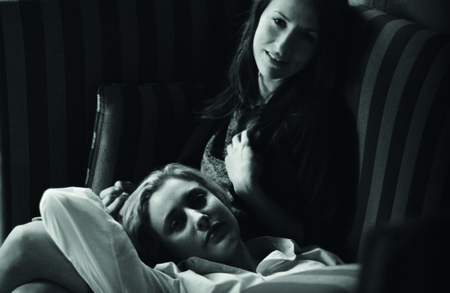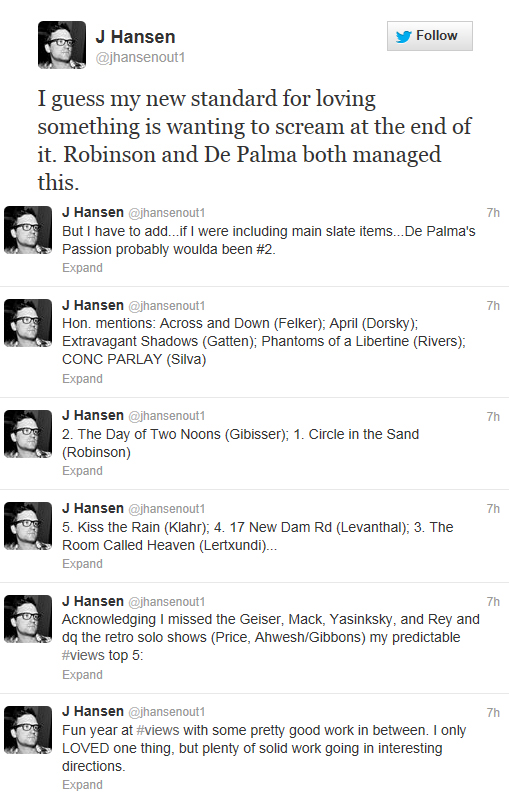
Updated: Tuesday, October 9, 2012 6:29 PM CDT
Post Comment | Permalink | Share This Post
 Hello and welcome to the unofficial Brian De Palma website. Here is the latest news: |
|---|
E-mail
Geoffsongs@aol.com
-------------
Recent Headlines
a la Mod:
Listen to
Donaggio's full score
for Domino online
De Palma/Lehman
rapport at work
in Snakes
De Palma/Lehman
next novel is Terry
De Palma developing
Catch And Kill,
"a horror movie
based on real things
that have happened
in the news"
Supercut video
of De Palma's films
edited by Carl Rodrigue
Washington Post
review of Keesey book
-------------
Exclusive Passion
Interviews:
Brian De Palma
Karoline Herfurth
Leila Rozario
------------
------------
| « | October 2012 | » | ||||
| S | M | T | W | T | F | S |
| 1 | 2 | 3 | 4 | 5 | 6 | |
| 7 | 8 | 9 | 10 | 11 | 12 | 13 |
| 14 | 15 | 16 | 17 | 18 | 19 | 20 |
| 21 | 22 | 23 | 24 | 25 | 26 | 27 |
| 28 | 29 | 30 | 31 | |||
De Palma interviewed
in Paris 2002
De Palma discusses
The Black Dahlia 2006

Enthusiasms...
Alfred Hitchcock
The Master Of Suspense
Sergio Leone
and the Infield
Fly Rule
The Filmmaker Who
Came In From The Cold
Jim Emerson on
Greetings & Hi, Mom!
Scarface: Make Way
For The Bad Guy
Deborah Shelton
Official Web Site
Welcome to the
Offices of Death Records

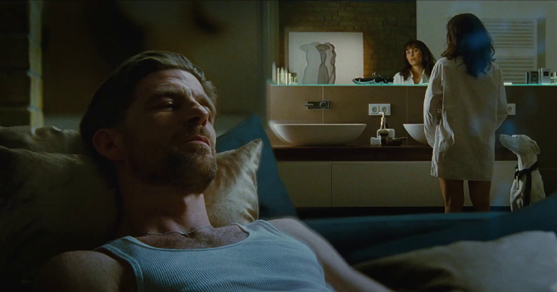
Cinespect's Cole Hutchinson, a self-proclaimed "De Palma admirer," says that Passion "manages to stand proudly amongst the best of [De Palma's] oeuvre." Hutchinson asserts that, like most of De Palma's films, Passion will please an audience simply seeking entertainment, while also offering layers of meaning for those interested in digging deeper. "This is a De Palma film that celebrates De Palma films while simultaneously mocking them," writes Hutchinson. "With spectacular performances across the board, an especially effective trademark split-screen moment, and the modern wit to suggest that the ubiquitous Apple laptop is the new symbolic phallus of easy power (also the tool of its eventual inevitable downfall), Passion is an exquisitely enjoyable summation of its director’s past triumphs streamlined into a sexy morality tale for today’s bizarre, superficial world."
Another self-professed De Palma fan, The Highlighter's Alex Greenberger, writes that "Passion is another defiantly satirical film from De Palma, and therefore it’s a work that’s sure to polarize for years to come. For De Palma’s fans (of which I am one), Passion is going to be an extremely rewarding experience, complete with diabolical lesbians, mistaken identities, twins and comments on gender roles. For his detractors, this will be another miserable failure, complete with awful dialogue, mediocre performances and baroque twists." Greenberger highlights that there are essentially two halves to the film. "For the first half, which may be a bit more stolid (and, as a result, a little less successful) than typical De Palma fare, it’s just one entertaining sequence after another. Passion, at its start, plays like a parody of workforce melodrama—something like Disclosure, maybe—with awesomely bad crying and a purposefully overconfident score from Pino Donaggio. Even the performances point to a masterful dissection of the melodrama—McAdams brilliantly says “Call me NEVER!” and throws her phone to the ground with such panache that it’s hard not to be entranced by the intentional mediocrity of this movie. But at a critical moment, one that of course involves a split-screen, since this is the world of Brian De Palma, the film snaps and becomes so formally refined—everything seems to click together at once, and the narrative dramatically perks up." Greenberger goes on to praise the split screen sequence and the cinematography: "It almost goes without saying that the split-screen sequence, which juxtaposes a Claude Debussy ballet with a complex murder and then proceeds to weave in and out of the murderer’s subjectivity, is stunning. But it’s José Luis Alcaine’s super-saturated photography that shines in this film. His beautiful, tight close-ups of the film’s plethora of ridiculous designer shoes are marvelous, but that, combined with De Palma’s directorial abilities, make this film yet another formally concerned (and successful) work."
Floating Heads' Cory Everett writes of De Palma, "After a half decade away from the camera, there’s a certain thrill in seeing the director get back to doing what he does best. In Passion, (a remake of the 2010 French film Love Crime), DePalma finds the perfect vehicle to indulge his cinematic obsessions." Everett echoes the idea that the film is split in half, writing that "the second half of the picture loses some of the trashy fun of the first half but replaces it with rococo camerawork, canted angles, split screens and a heavy dose of film noir lighting courtesy of cinematographer Jose Luis Alcaine (on loan from Pedro Almodovar). De Palma also recruits one of his longtime composers Pino Donaggio for a bombastic score. It’s a B-movie and minor work for the filmmaker but still a fair bit of fun for anyone who misses the the feel of those earlier works."
And finally, The Lumière Reader's Brannavan Gnanalingam has posted a late dispatch from Venice, where he experience the boos that greeted both Terrence Malick's To The Wonder and De Palma's Passion. However, while he was not surprised by the booing, Gnanalingam enjoyed both films quite a bit. "Full of narrative twists, femme fatales, double identities, and an absurd lack of subtlety," writes Gnanalingam, "it’s yet another homage to Hitchcock, in a career full of homage. The performances veered eerily close to parody (McAdams as the horrible boss almost fails to convince in her excesses, while Noomi Rapace plays it straight almost to the point of falling asleep), the setting was grand and sneeringly superficial, and the continual narrative contrivances drew laboured groans of agony from some critics. All of this said, it was all rather fun."
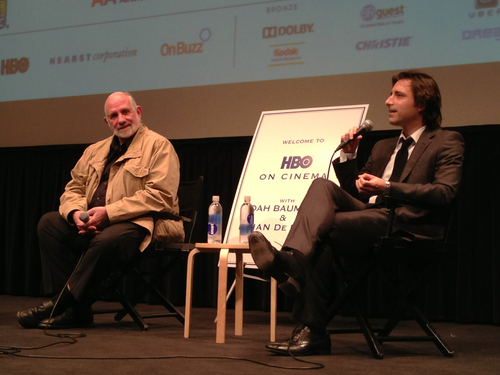
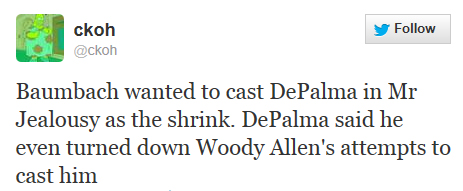
[Note: the role of the shrink in Mr. Jealousy ended up being played by Peter Bogdanovich. De Palma did appear as a "Famous American Movie Director" in the extremely hard to find German film, Rotwang muß weg! (1994), written and directed by Hans-Christoph Blumenberg.]

Pictured above: Scott Foundas (left) moderating "On Cinema" discussion between Brian De Palma and Noah Baumbach at the New York Film Festival Sunday.
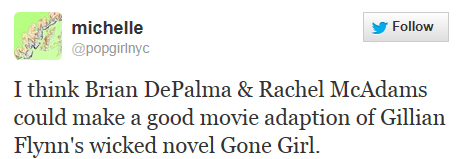
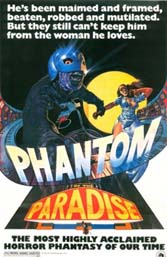 Brian De Palma's phenomenal Phantom Of The Paradise screens at 12:05 tonight (Saturday) at Brooklyn's Nighthawk Cinema. (So if you happen to be lucky enough to be heading to tonight's 9pm screening of De Palma's Passion at the Walter Reade Theater, you could make it a De Palma double feature, with a nice break in between.) The Principal Archivist at The Swan Archives notes that it will be a DCP screening, which, despite all the troubles with the DCP [non-]screening of Passion a week ago, should make for a pristine cinematic experience. "DCP," the Archivist adds, "provides a super high quality, scratch and splice free presentation with remixed sound...the [Phantom Of The Paradise] has never looked or sounded better." Phantom also screened last night at midnight at the Nighthawk.
Brian De Palma's phenomenal Phantom Of The Paradise screens at 12:05 tonight (Saturday) at Brooklyn's Nighthawk Cinema. (So if you happen to be lucky enough to be heading to tonight's 9pm screening of De Palma's Passion at the Walter Reade Theater, you could make it a De Palma double feature, with a nice break in between.) The Principal Archivist at The Swan Archives notes that it will be a DCP screening, which, despite all the troubles with the DCP [non-]screening of Passion a week ago, should make for a pristine cinematic experience. "DCP," the Archivist adds, "provides a super high quality, scratch and splice free presentation with remixed sound...the [Phantom Of The Paradise] has never looked or sounded better." Phantom also screened last night at midnight at the Nighthawk.In his opening paragraph, Courrier mentions that he screened Phantom in a class on Alfred Hitchcock and De Palma: "Director Brian De Palma has accumulated a long list of neglected gems (The Fury, Blow Out, Casualties of War, Redacted), but the one whose neglect makes the least sense is his ingenious satirical rock musical, Phantom of the Paradise (1974). Fiendishly clever and percolating with film-making fever, De Palma provides ingenious allusions to Phantom of the Opera, The Cabinet of Dr. Caligari and The Picture of Dorian Gray. (Last year, while teaching a class on Alfred Hitchcock and Brian De Palma, I had more angry responses to this picture than some of De Palma's more inflammatory work.) But this pulsing musical comedy is an exhilarating modern retelling of the Faust myth (with roots in Dante's Divine Comedy) wherein a man becomes so consumed by his thirst for divine knowledge that he sells his soul to the Devil. In Phantom of the Paradise, though, the thirst is for something perhaps a little less lofty: rock immortality."
 Peter Labuza has written about Brian De Palma's Passion for his own blog, disussed it on his Cinephiliacs podcast, and now writes about it again for Indiewire. This time, Labuza includes Passion in an article that groups together three films at the New York Film Festival that "question our evolving relationship to the digital." The other two films are Leos Carax' Holy Motors and Alain Resnais' You Ain’t Seen Nothin’ Yet. "Of the three," writes Labuza, "Passion is the most optimistic, even if it tells a gruesome story of betrayal and revenge."
Peter Labuza has written about Brian De Palma's Passion for his own blog, disussed it on his Cinephiliacs podcast, and now writes about it again for Indiewire. This time, Labuza includes Passion in an article that groups together three films at the New York Film Festival that "question our evolving relationship to the digital." The other two films are Leos Carax' Holy Motors and Alain Resnais' You Ain’t Seen Nothin’ Yet. "Of the three," writes Labuza, "Passion is the most optimistic, even if it tells a gruesome story of betrayal and revenge."NAIVE & LAZY TO APPROACH 'PASSION' ONLY AS CAMP
"The decision to take the narrative from the 2010 French film Love Crime by Alain Corneau might seem odd," writes Labuza, "and some of the angry reactions to Passion have approached the film naively by examining it only as camp (an easy task when you have lines like 'Do you think I don’t see what’s going on in that dyke brain of yours?'). But to dismiss Passion as nothing more than a film with an occasional interesting camera movement seems ignorant, if not downright lazy."
And camp is precisely the approach taken by Film School Rejects' Caitlin Hughes, who seems to assume that De Palma was aiming for camp. The opening of her Passion review tries to Film School the reader: "Good camp films know what they are doing. They manipulate the audience into feeling exaggerated sorts of emotion and possess a sort of bravura that makes them unabashedly watchable. Based on Alain Corneau’s 2010 film Love Crime, Brian De Palma’s new offering, Passion, is definitely campy, but oftentimes it borders on just plain stupid. It is aimlessly over-the-top with eye-rolling twists and turns – for nearly the last quarter of the film, De Palma wastes the audience’s time with fake out after fake out (just kidding, guys – she was dreaming… TIMES FIVE!). The director lacks the artfulness in filmmaking that he once possessed in classics like Dressed to Kill." (The latter film is classified by Hughes as "good camp.")
Hughes seems to be confused by the film: "Passion’s mostly generic look makes you yearn for the saturated filmy-ness that was indicative of De Palma’s earlier work. This film could be made by anyone and lacks many of the notable De Palma stylistic traits. Toward the end, he suddenly switches to heavy-handed chiaroscuro lighting, which then also abruptly stops. No symbolism behind this is made evident. This inconsistent cinematography in combination with De Palma regular Pino Donaggio’s bizarrely ‘80s-TV-movie-sounding score makes for quite the odd final product. Passion is so teetering on the edge of bad that it might end up being screened ironically in a couple of years, as Showgirls is now."
Hughes followed up her review a couple of days later with a side-by-side "cat fight" between Paul Verhoeven's Showgirls and Passion. Hughes' final verdict:
"It will, undoubtedly, be included at camp classic screenings, but it might take a while for its campiness to marinate in pop culture. Passion is campy, but Showgirls is beyond campy, thanks largely to Elizabeth Berkley. Cristal and Nomi have a pop culture rivalry for the ages that while they come close, Christine and Isabelle can’t quite match their hilarious badness."
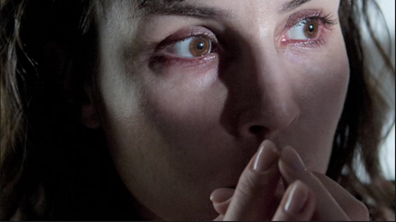 Noting that "Brian De Palma and Noah Baumbach have become thick as thieves," The Village Voice's Nick Pinkerton reviews the two filmmakers' new films side-by-side. "While De Palma's black comedy re-phrases Godard's 'To live in society today is like living in one enormous comic-strip' to a contemporary 'To live in society today is like living in a digital hall-of-mirrors'," writes Pinkerton, "Frances Ha is blown along by the French New Wave's gentler spirits." Pinkerton playfully toys with an attempt to link the two filmmakers' works together, at one point writing of Frances Ha that "Frances repeatedly describes Sophie and herself as 'the same person'--Identical twins? A hidden thematic link between De Palma and Baumbach?"
Noting that "Brian De Palma and Noah Baumbach have become thick as thieves," The Village Voice's Nick Pinkerton reviews the two filmmakers' new films side-by-side. "While De Palma's black comedy re-phrases Godard's 'To live in society today is like living in one enormous comic-strip' to a contemporary 'To live in society today is like living in a digital hall-of-mirrors'," writes Pinkerton, "Frances Ha is blown along by the French New Wave's gentler spirits." Pinkerton playfully toys with an attempt to link the two filmmakers' works together, at one point writing of Frances Ha that "Frances repeatedly describes Sophie and herself as 'the same person'--Identical twins? A hidden thematic link between De Palma and Baumbach?"Pinkerton continues, "The color-coded casting--McAdams is blonde, Rapace brunette, Herfurth a redhead--has nothing to do with the director's positioning the women as symbolic placeholders representing various aspects of femininity. They're not merely passive subjects. De Palma respects his heroines as equal participants in his masquerade, colleagues in the field of image-making--McAdams at one point appears with the 'Image' of a Koch Image sign iconographically situated behind her--working towards hidden objectives from under cover of their archetypal roles, less clearly-delineated personalities than stand-in avatars representing themselves in a real-world that is ever more dissonantly virtual, their every interaction offering multivalent readings.
"McAdams, for example, does a fine (faux-?) heart-to-heart with Rapace, crying (crocodile?) tears over the girlhood death of a twin sister, a scene whose almost parodic pathos confounds comfortable response--as does Passion. Like most De Palma, it works perfectly well as slinky 'fun trash'--all the while throwing off infinitely more ideas per minute than works which present themselves to the public under the cumbersome mantle of art."
(Regarding the "trash" aesthetic, note De Palma's comment to MUBI's Daniel Kasman: "That's what I also don't like, when they say 'shoddy' and 'trashy,' when we try to make these people look as gloriously beautiful as we can. I keep wondering, 'What are you watching? Are you watching the screen?'”)
An image from Frances Ha:
